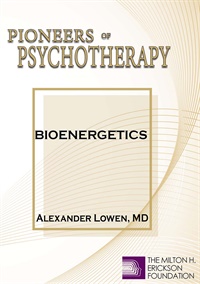
- Average Rating:
- Not yet rated
- Topic Areas:
- Clinical Demonstrations | Bioenergetics | Eating Disorders | Aging and Mortality | Psychotherapy | Abuse | Mind-Body
- Bundle(s):
- Pioneers of Psychotherapy Bundle
- Categories:
- Pioneers of Psychotherapy | Evolution of Psychotherapy | Evolution of Psychotherapy 2000
- Faculty:
- Alexander Lowen, MD
- Course Levels:
- Master Degree or Higher in Health-Related Field
- Duration:
- 00:59:00
- Format:
- Audio and Video
- Original Program Date:
- May 27, 2000
- Short Description:
- Alexander Lowen (2000) demonstrates with Ann, who he used as a ten years earlier. She reports that since that first session she has been free of severe asthma attacks. She is now troubled by the death of her father and mother, abuse from her brother, excessive weight gain and the onset of menopause. Lowen guides her through a series of movement exercises.
- Price:
- $59.00 - Base Price
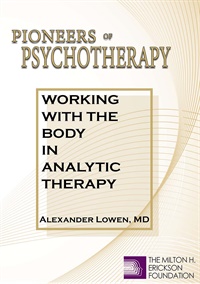
- Average Rating:
- Not yet rated
- Topic Areas:
- Clinical Demonstrations | Mind-Body | Psychotherapy | Bioenergetics
- Bundle(s):
- Pioneers of Psychotherapy Bundle
- Categories:
- Pioneers of Psychotherapy | Evolution of Psychotherapy | Evolution of Psychotherapy 1995
- Faculty:
- Alexander Lowen, MD
- Course Levels:
- Master Degree or Higher in Health-Related Field
- Duration:
- 01:01:00
- Format:
- Audio and Video
- Original Program Date:
- Dec 15, 1995
- Short Description:
- Alexander Lowen (1995) demonstrates with John who is dissatisfied with his body. Through exercises, Lowen helps John use his body to express his full range of feelings. Lowen explains that he does not rely on the mind to change behavior because of its lack of power. Lowen expects the body to free itself. The demonstration concludes with Lowen’s elaboration on his work.
- Price:
- $59.00 - Base Price
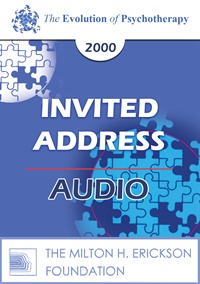
- Average Rating:
- Not yet rated
- Topic Areas:
- Invited Addresses | Bioenergetics | Mind-Body | Psychotherapy
- Categories:
- Evolution of Psychotherapy | Evolution of Psychotherapy 2000
- Faculty:
- Alexander Lowen, MD | Eugene Gendlin, PhD
- Duration:
- 1 Hour 19 Minutes
- Format:
- Audio Only
- Original Program Date:
- May 28, 2000
- Short Description:
- Since the person is his body, it is possible to read the history of the individual from the pattern of chronic muscular tension in his body. These chronic tensions limit the individual's ability to respond in a healthy way to the stresses of life. Bioenergetics provides a technique for reducing these tensions.
- Price:
- $15.00 - Base Price

- Average Rating:
- Not yet rated
- Topic Areas:
- Workshops | Bioenergetics | Mind-Body | Psychotherapy
- Categories:
- Evolution of Psychotherapy | Evolution of Psychotherapy 2000
- Faculty:
- Alexander Lowen, MD | Heiner Steckel, Dipl. Pad.
- Duration:
- 1 Hour 45 Minutes
- Format:
- Audio Only
- Original Program Date:
- May 25, 2000
- Short Description:
- After an introduction to the key concepts of working with the body, all participants will be invited to do some bioenergetic exercises to experience the value of this technique. Participants will be asked to describe their experience.
- Price:
- $15.00 - Base Price
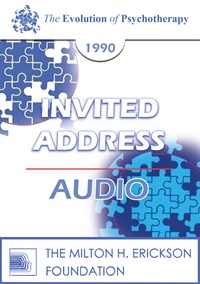
- Average Rating:
- Not yet rated
- Topic Areas:
- Invited Addresses | Bioenergetics | Mind-Body | Psychotherapy
- Categories:
- Evolution of Psychotherapy | Evolution of Psychotherapy 1990
- Faculty:
- Alexander Lowen, MD | Miriam Polster
- Duration:
- 1 hour 28 minutes
- Format:
- Audio Only
- Original Program Date:
- Dec 14, 1990
- Short Description:
- Recognition of body-mind unity requires acceptance of the fact that the body in its form and motility expresses the individual's personality as much as behavior and thinking. If there is to be a change in personality, the body must reflect that change. To change bodily attitude, one should work directly with the energy dynamics of the body. By mobilizing a person's energy, one opens up deep feelings that are otherwise inaccessible. This is critical in the treatment of depression which is directly connected to an energetic collapse in the body. The address will describe how one increases an individual's energy to promote his pleasure in life.
- Price:
- $15.00 - Base Price

- Average Rating:
- Not yet rated
- Topic Areas:
- Workshops | Bioenergetics | Mind-Body | Personality Disorders | Psychotherapy
- Categories:
- Evolution of Psychotherapy | Evolution of Psychotherapy 1990
- Faculty:
- Alexander Lowen, MD
- Duration:
- 2 Hours 48 Minutes
- Format:
- Audio Only
- Original Program Date:
- Dec 13, 1990
- Short Description:
- This workshop will discuss and demonstrate how to involve the body in the therapeutic process. There will be a live presentation using volunteers from the audience. A video presentation also may be shown and discussed. Basic bioenergetic techniques will be demonstrated. The role of sexuality in emotional problems will be examined.
- Price:
- $15.00 - Base Price
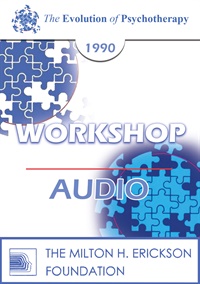
- Average Rating:
- Not yet rated
- Topic Areas:
- Workshops | Bioenergetics | Mind-Body | Psychosomatics | Psychotherapy
- Categories:
- Evolution of Psychotherapy | Evolution of Psychotherapy 1990
- Faculty:
- Alexander Lowen, MD
- Duration:
- 2 Hours 36 Minutes
- Format:
- Audio Only
- Original Program Date:
- Dec 16, 1990
- Short Description:
- This workshop will focus on physical (muscular) tension in the body and relate it to emotional conflicts in the present, derived from early childhood experiences. Specific attention will be paid to temporomandibular tension and to disturbances in breathing. Asthma will be examined as an emotional problem. The dynamics of headaches will be studied, and techniques for releasing underlying tension will be demonstrated.
- Price:
- $15.00 - Base Price
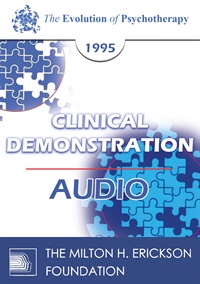
- Average Rating:
- Not yet rated
- Topic Areas:
- Clinical Demonstrations | Bioenergetics | Mind-Body | Psychotherapy
- Categories:
- Evolution of Psychotherapy | Evolution of Psychotherapy 1995
- Faculty:
- Alexander Lowen, MD
- Duration:
- 57 Minutes
- Format:
- Audio Only
- Original Program Date:
- Dec 16, 1995
- Short Description:
- Educational Objectives: To state what features in a person's body express his emotional conflicts. To name a body technique that directly effects a personality program.
- Price:
- $15.00 - Base Price
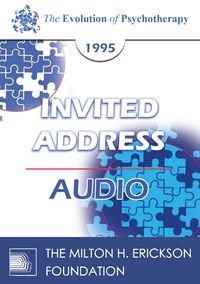
- Average Rating:
- Not yet rated
- Topic Areas:
- Invited Addresses | Bioenergetics | Mind-Body | Psychotherapy
- Categories:
- Evolution of Psychotherapy | Evolution of Psychotherapy 1995
- Faculty:
- Alexander Lowen, MD | Judd Marmor
- Duration:
- 1 Hour 31 Minutes
- Format:
- Audio Only
- Original Program Date:
- Dec 13, 1995
- Short Description:
- The split in the modern personality is between the head and the body, between the rational mind and irrational gut feelings. It reflects the split in this culture between science and the natural forces in life and nature which science attempts to control. The modern individual lives largely in his head and is out of touch with his body because he had deadened it to suppress the fear, the pain and the despair which he experienced in childhood.
- Price:
- $15.00 - Base Price
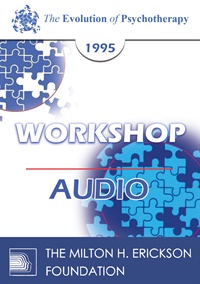
- Average Rating:
- Not yet rated
- Topic Areas:
- Workshops | Bioenergetics | Mind-Body | Psychotherapy
- Categories:
- Evolution of Psychotherapy | Evolution of Psychotherapy 1995
- Faculty:
- Alexander Lowen, MD | Heiner Steckel, Dipl. Pad.
- Duration:
- 2 Hours 30 Minutes
- Format:
- Audio Only
- Original Program Date:
- Dec 14, 1995
- Short Description:
- Patients come to therapy because they have problems. These problems range from difficulties in working, in social and sexual relationships and in functioning. Symptoms may be depression, anxiety and fear, or a general sense that life has no meaning. In all cases it can be seen that the body is emotionally crippled by chronic muscular tensions which limit the person's energy and decreases his vitality. In this workshop Lowen explains how one recognizes these tensions and how they can be released.
- Price:
- $15.00 - Base Price

